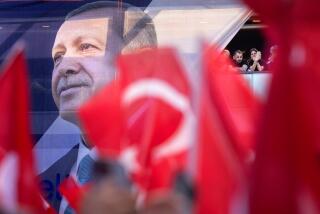Turkish Support May Be Illusory
The road to Baghdad runs through Turkey. As one of Washingtonâs strongest political and military allies in the region, Turkey seems to be the only one standing firm with the U.S. in offering its airspace and territory to launch an attack on Iraq.
Yet while Turkish leaders voice public support for âregime changeâ in Iraq, they do so through clenched teeth. Although Turkey has problems with Saddam Hussein, it fears internal political and economic instability far more than weapons of mass destruction.
Turkey is teetering on the edge of a political disaster that could seriously hurt the Bush administrationâs plans in Iraq. Polls suggest that more than six major parties will fail to obtain the necessary 10% support needed to gain entry into Parliament in Turkish elections in November. All signs point to a bizarre situation in which Islamists, whom the military removed from power in 1998, attempt to return to government with a parliamentary majority gained through a mere 25% of the vote.
This kind of political weakness is eerily similar to the situation that led to Turkeyâs crippling 2001 financial crisis. At that time, Turkey reeled through an unplanned and chaotic float of the Turkish lira, a huge International Monetary Fund bailout and soaring unemployment.
Washington supported Turkey in the IMF on the condition that massive structural improvements be made. International investors did not have confidence--most of them removed their capital from Turkish markets, leaving the economy with a diminished capacity to rebuild. Investors are still waiting for the reforms of the IMF program to take root.
In 2001, Turkeyâs governmental coalition could deal with the crisis. After the November elections, it probably will not have that luxury. An attack on Iraq would only exacerbate the tension that exists between elected Islamists and the unelected military. This political tension could lead to more economic trouble. With investors already skeptical of Turkeyâs structural reforms, any further instability will only reinforce their belief that the Turkish economy cannot recover.
Why should Washington care about Turkeyâs political and economic situation? First, if U.S. actions in Iraq cause the political and economic situation to deteriorate, Turkish popular support for an attack (which is already very low) will disappear altogether.
Second, Turkeyâs border with Iraq is the heartland of support for the Islamists. In the Gulf War, Turkey voluntarily shut off its profitable oil pipelines and trade with Iraq. This caused the economy of the area to collapse. It has recovered only with the reestablishment of trade with Iraq, a move Washington opposed. An Islamist government that counts on the support of this area will not agree to such voluntary cutoffs.
Third, this is the region where Turkey fought a bitter civil war with the Kurds in the 1990s. An attack on Iraq would upset the delicate balance of Turkeyâs relations with its own Kurds as well as with Kurds in northern Iraq.
In northern Iraq, Turkey supports a fragile, quasi-independent Kurdish entity in the hope that it will never become a state. If U.S. plans include a Kurdish state, Turkey will withdraw its support.
As Turkey heads for elections, Iraq is the only political issue that unites the country. Leftists, rightists, nationalists and Islamists all agree that an attack on Iraq now would again unleash the specter of instability within Turkey and its volatile neighborhood.
While Turkey will give lip service to U.S. actions, the Bush administration may find that even that will evaporate once the true costs to the Turkish people are revealed. Without a clear plan for dealing with the consequences of a war in Iraq on their country, Turks will remain rightfully skeptical about why they are allowing it to happen from their territory.
More to Read
Sign up for Essential California
The most important California stories and recommendations in your inbox every morning.
You may occasionally receive promotional content from the Los Angeles Times.










